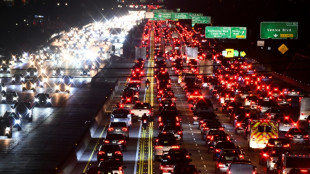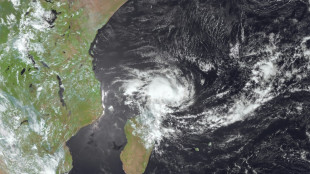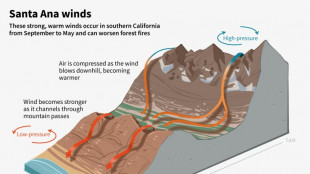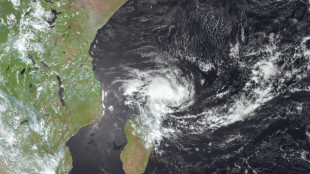
-
 Asian stocks follow Wall St higher on welcome US inflation data
Asian stocks follow Wall St higher on welcome US inflation data
-
Toyota arm Hino makes deal to settle emission fraud case

-
 Fire-wrecked Los Angeles gets a break as winds drop
Fire-wrecked Los Angeles gets a break as winds drop
-
Superb Swiatek races into third round at Australian Open

-
 Biden warns of dangerous 'oligarchy' in dark farewell speech
Biden warns of dangerous 'oligarchy' in dark farewell speech
-
Herbicide under US scrutiny over potential Parkinson's link

-
 South Korea's Yoon to avoid fresh questioning after dramatic arrest
South Korea's Yoon to avoid fresh questioning after dramatic arrest
-
Behind the Gaza deal: a US odd couple and last-minute snags

-
 Noisy racket on Australian Open 'party court' forces match move
Noisy racket on Australian Open 'party court' forces match move
-
AFP strikes deal for France's Mistral AI to use news articles

-
 'Sensational' Arsenal back in title race: Arteta
'Sensational' Arsenal back in title race: Arteta
-
Survivors count the mental cost of Los Angeles fires
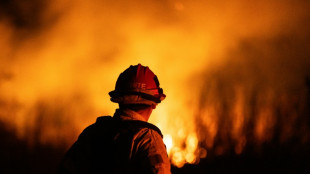
-
 Arsenal reignite Premier League title charge as Isak stars again
Arsenal reignite Premier League title charge as Isak stars again
-
Thousands across Gaza celebrate ceasefire deal

-
 Postecoglou slams 'nowhere near good enough' Spurs after Arsenal defeat
Postecoglou slams 'nowhere near good enough' Spurs after Arsenal defeat
-
Moyes 'under no illusions' after defeat on Everton return

-
 Arsenal reignite Premier League title hopes as Isak stars again
Arsenal reignite Premier League title hopes as Isak stars again
-
Yamal drives dominant Barca past Betis into Copa del Rey quarters

-
 Arsenal fightback sinks Spurs to ignite title bid
Arsenal fightback sinks Spurs to ignite title bid
-
Qatar, US announce Gaza truce, hostage release deal

-
 US consumer inflation rises in December but underlying pressures ease
US consumer inflation rises in December but underlying pressures ease
-
McGregor accused of sexual assault in civil suit

-
 Inter's title defence slowed by draw with spirited Bologna
Inter's title defence slowed by draw with spirited Bologna
-
Isak fires Newcastle into Premier League top four, Moyes misery

-
 Sane hits brace as Bayern thump Hoffenheim
Sane hits brace as Bayern thump Hoffenheim
-
Aston Villa ruin Moyes' Everton return

-
 Norman replaced as CEO of LIV Golf
Norman replaced as CEO of LIV Golf
-
SpaceX delays latest Starship megarocket test to Thursday
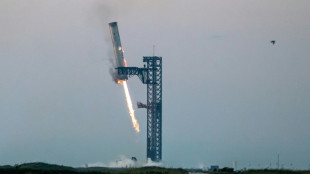
-
 Quake-stricken Vanuatu heads to polls in snap election
Quake-stricken Vanuatu heads to polls in snap election
-
Qatar, US announce Gaza truce, hostage release deal agreed

-
 Galaxy sign Zanka from Anderlecht
Galaxy sign Zanka from Anderlecht
-
Police probe abuse of Havertz's wife after Arsenal star's woes

-
 Drake files defamation suit against Universal over Kendrick Lamar track
Drake files defamation suit against Universal over Kendrick Lamar track
-
Qatar PM says Gaza truce, hostage release deal agreed

-
 US firms concerned about Trump tariff, immigration plans: Fed
US firms concerned about Trump tariff, immigration plans: Fed
-
Yellen warns against extending Trump's first-term US tax cuts

-
 Biden hails Gaza deal, says worked with Trump
Biden hails Gaza deal, says worked with Trump
-
US Supreme Court weighs Texas age-check for porn sites

-
 Brad Pitt isn't messaging you, rep warns, after adoring fan scammed
Brad Pitt isn't messaging you, rep warns, after adoring fan scammed
-
Trump's Energy Dept pick wants to develop renewables... and fossil fuels

-
 Cuba starts freeing prisoners after US terror list deal
Cuba starts freeing prisoners after US terror list deal
-
Fire-wrecked Los Angeles waits for winds to drop

-
 Prince William makes pub visit to meet fellow Aston Villa fans
Prince William makes pub visit to meet fellow Aston Villa fans
-
Mediators announce Gaza truce, but Israel says some points 'uresolved'

-
 Van Dijk laughs off talk of Liverpool wobble after more dropped points
Van Dijk laughs off talk of Liverpool wobble after more dropped points
-
Rubio vows to confront 'dangerous' China, deter Taiwan invasion

-
 Man City's Premier League title defence is over: Foden
Man City's Premier League title defence is over: Foden
-
Society centred around women in UK during Iron Age: scientists
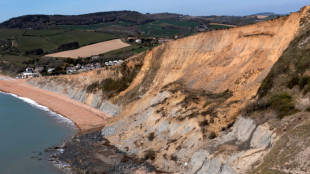
-
 UK government bans 'zombie drug' xylazine
UK government bans 'zombie drug' xylazine
-
Israel, Hamas agree deal for Gaza truce, hostage release: source briefed on talks


Climate change primary driver of amphibian decline: study
Climate change has become the main factor driving amphibians towards extinction as they remained the most threatened vertebrates over the past two decades, according to research published on Wednesday.
Frogs, toads, newts, salamanders and other cold-blooded creatures living in moist settings are acutely vulnerable to changes in their environment.
As they breathe through their skin and have no feathers, hair or scales for protection, extreme heat linked to climate change means they dehydrate quickly and lose breeding sites that need moisture.
More frequent, intense and longer storms, floods and higher sea levels can destroy their forest habitats and breeding grounds.
"In many cases these changes are happening too quickly for them to adapt," said Kelsey Neam, of the Amphibian Specialist Group at the International Union for Conservation of Nature's (IUCN) Species Survival Commission.
"Climate change is an underestimated threat to amphibians" and will become "more evident" as more data emerges going forward, she added, predicting "an exponential effect".
"We expect climate change to push species closer to extinction," Neam told AFP.
A landmark 2004 study, the Global Amphibian Assessment, showed amphibians were the world's most threatened vertebrates.
In a paper published in the journal Nature on Wednesday, researchers built on a second such study published last year that evaluated 8,011 species for the IUCN Red List.
They found almost 41 percent of amphibians were globally threatened, defined as appearing under the list's "critically endangered", "endangered" and "vulnerable" categories.
That represented a deterioration from 37.9 percent in 1980 and 39.4 percent in 2004.
Climate change was the main driver of 39 percent of status declines from 2004 to 2022, affecting 119 species, with habitat loss and degradation at 37 percent.
Climate change can also exacerbate other threats such as fires, disease and land use change, the authors noted.
Habitat loss and damage linked to agriculture, infrastructure development and other industries remained the most common threat but did not primarily drive as many status deteriorations.
In contrast, habitat loss and disease -- especially the chytrid fungus, which devastated amphibians worldwide starting in the late 1990s -- were responsible for 91 percent of status deteriorations between 1980 and 2004, with just one percent primarily due to climate change.
- 'Investment in our planet' -
Threatened species were concentrated most in Caribbean islands, Mesoamerica, the tropical Andes, Cameroon, Nigeria, Madagascar, India's Western Ghats mountain range and Sri Lanka.
Salamanders and newts were the most affected species.
For example, five US salamander species have experienced status declines due to fires and less humid soils caused by droughts and wildfires that scientists say climate change has exacerbated.
In parts of Australia and Brazil, reduced rainfall linked to climate change is predicted to threaten the reproduction of frogs that depend on high levels of moisture in the soil and fallen leaves to prevent their eggs drying up.
The authors called for greater investment and policy responses to support amphibians, which play a key role in ecosystems and can help fight climate change.
They are prey for mammals, birds and reptiles, contribute to recycling nutrients and help sustain the food web, which would collapse without them, said Neam, who highlighted the urgency of protecting habitats and slashing carbon emissions.
"By protecting amphibians, we are protecting the forests and ecosystems that are key, nature-based solutions to battling climate change," she told AFP.
"An investment in amphibians is an investment in the future of our planet."
Amphibians' small distribution often makes them more vulnerable to extinction than other vertebrates, but that can also facilitate conservation efforts, said study co-author Jennifer Luedtke, of the IUCN's Amphibian Specialist Group.
Improved habitat protection and management played major roles in species who improved their category between 2004 and 2022, Neam added.
L.Miller--AMWN
